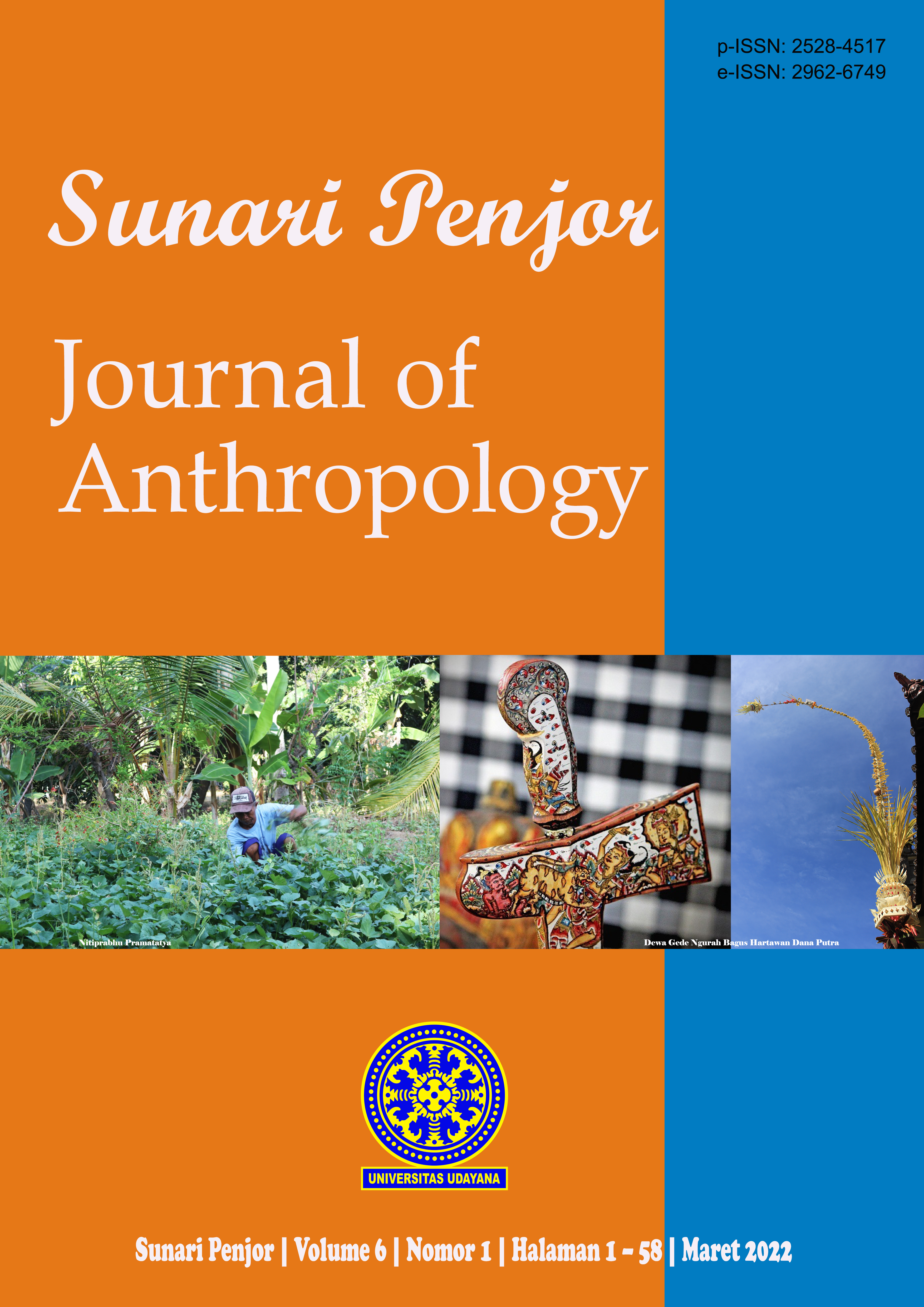Hedonisme Clubbers dalam Nightclub Studi Kasus Pandemi Covid-19 di Kelurahan Seminyak
Abstract
When clubbers want to enter a nightclub they must know the rules that apply in a club. The applicable rules are in the form of the type of clothing worn, minimum age, luggage that is allowed to be brought into the club. In the nightclub will be seen the characteristics, form of activity, and factors of attending a nightclub. The Covid-19 pandemic that is destroying much of the economy especially against club owners taking some action to save the existence of his club. With this formulation of the problems in this study are: 1. What are the characteristics, lifestyle forms of clubbers hedonism as well as factors that affect clubbers visiting a nightclub? 2. What is the situation of the night club in the midst of the Covid-19 Pandemic?. The method used in this study is qualitative as a support. The data sources used are types of primary and secondary data sources obtained through observations, interviews, literature studies, and documents. The analysis used is descriptive analysis. The study used David Chaney's theory of lifestyle and Jean P. Baudrillard's theory of consumerism.
Downloads
References
Anshori, N.S. (2013). “Makna Kerja (Meaning Of Work) Suatu Studi Etnografi Abdi Dalem Keraton Ngayogyakarta Hadiningrat Daerah Istimewa Yogyakarta”. Jurnal Psikologi Industri dan Organisasi, 2(3), pp. 157-162.
Badan Pusat Statistik Provinsi Bali. (2021). “Banyaknya Wisatawan Mancanegara Bulanan ke Bali Menurut Pintu Masuk (Orang), 2021”. https://bali.bps.go.id/indicator/16/106/1/banyaknyawisatawanmancanegarabulanan-ke-bali-menurut-pintu-masuk.html
Baudrillard, J.P. (2004). Masyarakat Konsumen. Kreasi Wacana.
Chaney, D. (2004). Lifestyles: Sebuah Pengantar Komprehensif. Jalasutra.
Cooper, C., Fletcher, J., Gilbert, D., Fyall, A., dan Wanhill, S. (1998). Tourism Principles and Practice. Pitman Publishing.
Friescella. (2013). “Gaya Hidup Dunia Gemerlap ‘Dugem’ Dikalangan Mahasiswa Kota Bandung (Studi Deskriptif Tentang Gaya Hidup Dunia Gemerlap Mahasiswa Kota Bandung dalam Menunjukkan Eksistensi Dirinya)”. Skripsi Ilmu Komunikasi Konsentrasi Humas FISIP Universitas Komputer Indonesia.
Harahap, R.J.T. (2020). “Karakteristik Klinis Penyakit Coronavirus 2019”. Jurnal Penelitian Perawat Profesional, 2(3), pp. 317-324. https://doi.org/10.37287/jppp.v2i3.145
Intan, T. (2021). “Budaya Konsumen dan Remaja Perempuan dalam Kumpulan Cerpen Satu Hari Berani Karya Sitta Karina”. Jurnal Sastra, 10(1), pp. 23-30. https://doi.org/10.15294/jsi.v10i1.40395
Koentjaraningrat. (1993). Metode-Metode Penelitian Masyarakat. PT. Gramedia.
Levani, Y. (2021). “Coronavirus Disease 2019 (COVID-19): Patogenesis, Manifestasi Klinis dan Pilihan Terapi”. Jurnal Kedokteran dan Kesehatan, 17(1), pp. 44-57. https://doi.org/10.24853/jkk.17.1.44-57
Mahyu, D. (2013). “Pengaruh Pendapatan Terhadap Tingkat Konsumsi pada Pegawai Negeri Sipil di Kantor Bupati Kabupaten Bireuen”. Jurnal Ekonomika, 4(7).
Mandey, S.L. (2009). “Pengaruh Faktor Gaya Hidup Terhadap Keputusan Pembelian Konsumen”. Jurnal, 6(1).
Muhyiddin. (2020). “Covid-19, New Normal dan Perencanaan Pembangunan di Indonesia”. The Indonesian Journal of Development Planning, 4(2), pp. 240-252. https://doi.org/10.36574/jpp.v4i2.118
Muslich, M. (2011). Pendidikan Karakter Menjawab Tantangan Krisis Multidimensional. Bumi Aksara.
Praditya, M.Y. (2015). “Dugem Remaja Putri Studi Tentang Gaya Hidup Remaja Putri di Kota Surabaya”. Skripsi Sosiologi FISIP Universitas Airlangga.
Ristyawati, A. (2020). “Efektifitas Kebijakan Pembatasan Sosial Berskala Besar Dalam Masa Pandemi Corona Virus 2019 oleh Pemerintah Sesuai Amanat UUD NRI Tahun 1945”. Administrative Law & Governance Journal, 3(2), pp. 240-249. https://doi.org/10.14710/alj.v3i2.240-249
Samani, M., dan Haryanto. (2011). Konsep dan Model Pendidikan Karakter. PT. Remaja Rosdakarya.
Subadra, I.N. (2021). “Pariwisata Budaya dan Pandemi Covid-19: Memahami Kebijakan Pemerintah dan Reaksi Masyarakat Bali”. Jurnal Kajian Bali, 11(1), pp. 1-22. https://doi.org/10.24843/JKB.2021.v11.i01.p01
Susilo, A., Rumende, C.M., Pitoyo, C.W., Santoso, W.D., Yulianti, M., Herikurniawan, Sinto, R., Singh, G., Nainggolan, L. Nelwan, E.J., Chen, L.K., Widhani, A., Wijaya, E., Wicaksana, B., Maksum, M., Annisa, F., Jasirwan, C.O., dan Yunihastuti, E. (2020). “Coronavirus Disease 2019: Tinjauan Literatur Terkini”. Jurnal Penyakit Dalam Indonesia, 7(1), pp. 45-67. http://dx.doi.org/10.7454/jpdi.v7i1.415
Tirtarahardja, U., dan Sulo, S.L. (2005). Pengantar Pendidikan. PT. Rineka Cipta.














